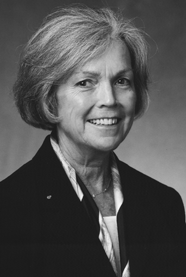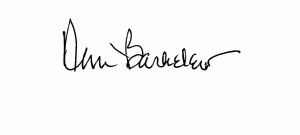This post is part of The Plank Center’s Legacies from Legends in PR Series that was begun in recognition of the 40th Anniversary of the Public Relations Student Society of America in 2007.
Barkelew’s 35-year career included C-suite experience in the public sector (LA County Office of Education), the private sector (Dayton Hudson Corp., aka Target Corp.) and an international agency (Fleishman-Hillard) where she was the founding general manager and senior partner. Named PR professional of the Year (1995) and one of the Most Influential Women in Business in Minnesota (1999). Past president, National School Public Relations Association. Received the Arthur W. Page Society’s Distinguished Service Award (2003), and recipient the 2012 Plank Center Legacy Mentorship Award.
We are a society of wonderful followers who need cheerleaders, direction, inspiration, motivation, thoughtful callers of the question with an orientation to action… we need leaders. In 2002 and again in 2007, I asked a cross-section of recognized leaders across the country their thoughts about the characteristics of excellent leaders, the key challenge leaders face today and why leadership is important. These CEOs, head of nonprofits, media chiefs and public relations leaders agreed that leadership then and now requires vision and goals, authenticity, ethics, curiosity, passion, a sense of humor, lots of positive energy and masterful people and communications skills.
All agreed that leadership is a responsibility, not power, prestige or a job title. It’s about WHO you have to be, not WHAT you have to do.
The new focus this year is “authenticity:” being real v. always being right. You see the same desire for authenticity in the popularity of today’s reality shows. And now, being “real” has emerged as a top criterion for candidates for national office.
My surveyed leaders identified six areas of key challenges:
1. Cutting through the static to get the message out, leaders need to be bold, fearless and clear in message.
2. Managing the competing elements of ego v. ethics in an oftentimes unethical world means leaders must read the context in which they are asked to lead correctly, do their jobs ethically and accept the risk of losing their leadership roles if what they champion is unacceptable.
3. Uniting a universe of followers behind a mission or set of goals means finding common ground in a society that is encouraged to divide.
4. Recognizing the absence of national examples and a culture that glorifies financial success may dilute what leaders can do.
5. Too much short-term thinking in business makes it harder to keep business focused on the long haul.
6. Stakeholders want value-driven behavior, credibility and sustainability in today’s leaders, not just superstars. People crave authentic leadership, defined vision, integrity, effectiveness, compassion and courage.
How important is leadership today?
Those I surveyed in 2007 said there is a growing hunger for leaders who can tip the scales in the right direction, creating accountability for behavior and results. They say people are “thirsty for positive direction, for someone to believe in.” Many used phrases like “nothing happens without leaders” and “leaders help us find ways to seek a common good.”
A dynamic young CEO said, “Leaders are not born. They are the product of hard work and determination in pursuit of a dream or passion.”
How can you become a leader?
- Set goals, have a vision, know your values. Ask yourself three questions: Who am I as a person? What do I want to be? How do I get there and make sure I stay there?
Write it down. Use it as your personal guideline.
- Don’t wait to be asked, speak up. Get involved in something and stretch your leadership wings.
- Look for opportunities to develop your people skills.
- Find some role models. Spend time around leaders you admire and learn from them.
- Be open to new thoughts, ideas and opportunities. Keep growing.
I believe the best leaders–the best professionals–work hard at what they do and never forget how to do. They are involved in their communities. When you are involved, you belong. Where you are involved, you grow.
Remember Linus’ advice to Lucy: “There’s no heavier burden than a great potential.”
Published: 2007
More from Ann Barkelew:

